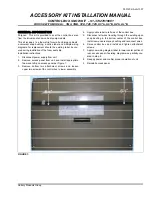
Model S4000CH
31
3.18 Automatic Remote Gas Calibrator (ARGC)
The S4000CH has an optional Automatic Remote Gas Calibrator.
The ARGC is a
combination of the above P/N’s for local remote calibration (Figure 8). The ARGC can be
remotely installed using the above P/N’s and P/N 32547-1 (Remote Junction Box, Figure 9).
The ARGC is intended for remote, unmanned sites, or hard to reach gas sensors. It can be
used for either Calibration Mode or Gas Check Mode. This system has a user supplied
permanent tank of calibration gas. When Calibration Mode is selected, the ARGC valve turns
on and off at the proper time. When Gas Check Mode is selected, the gas is turned on for 1
minute then turned off. If the gas does not arrive or leave at the appropriate time, an error will
be displayed.
The sensor and the ARGC work together as a system. The ARGC will try to detect a
defective valve, a bad sensor, empty gas cylinder, or stuck actuator and signal a problem by
a F12 fault. When a new sensor is installed, the user should select the new sensor
calibration.
In this mode, all ARGC faults are ignored.
The cause of the ARGC fault could
be a dirty ARGC or poisoned sensor. If the system goes to ARGC fault the valve and sensor
should be inspected. If the user calibrates again the ARGC faults will be cleared.
In poorly ventilated areas, the gas concentration at the sensor may be lower than that outside
the ARGC since the meshed cylinder of the ARGC reduces airflow to the sensor. Therefore,
when installing a sensor with an ARGC in a space with little air flow, it is important to adjust
the warning and alarm settings to a lower level.
NOTE:
The ARGC requires extra power. Connect the ARGC 24 VDC at TB2 pin 10 Refer to
Table 1.
3.19 Calibration Using the ARGC
To use the ARGC the user must have previously enabled the ARGC via the display, Modbus,
or HART. Once ARGC Mode is enabled it will remain enabled until disabled. To enter
Calibration Mode, send the appropriate Modbus or HART command or place the magnet over
the GM logo on the cover of the unit (Figure 7) and hold it there until “
AC
” (Figure 21)
appears on the display (about ten seconds). The display will indicate “
NS
” (New Sensor).
This is asking if a new sensor has been installed. A new sensor command can also be sent
via Modbus or HART.
NOTE:
If a new sensor is installed, the “NS” option must be selected.
“NS”
If a new sensor has been installed, apply the magnet, “
SEL
” appears on the display. All
ARGC errors will be ignored and the sensor life will be set to 100. If the sensor has been
calibrated before using the ARGC, the user does not have to apply the magnet when “
NS
” is
displayed.
“
100
”
The display shows the remaining sensor life for about ten seconds, while the unit
acquires the zero reading. If the user wants to reset the sensor life they can apply
the magnet at this time. Ensure that the sensor is seeing clean air during this time.
















































